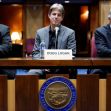Fred Eshelman, North Carolina financier, saw Trump’s supposed lead in battleground states disappear overnight. The day after the election, he and his advisers contacted a conservative Texas nonprofit group that was trying to expose voter fraud. After a 20-minute conversation with True the Vote’s president, Eshelman donated $2 million.
He regretted his donation more with the passing of the next twelve days and began to doubt conspiracy theories of rampant illegal voting after the “disappointing results” of True the Vote’s investigation.
Eshelman filed a lawsuit in federal court on November 23 to get his money back, claiming that True the Vote failed to account for how all the funds had been spent. He withdrew that lawsuit on February 1 and filed in a state court in Texas. Court documents show that none of his money was returned.
In his pleadings, Eshelman alleges that True the Vote did not spend his $2 million and a later donation of $500,000 as it said it would, but rather sent lots of his money to businesses or people associated with Catherine Engelbrecht, True the Vote’s president.
According to the litigation documents and interviews, True the Vote’s intended revelations of illegal election schemes shifted from one claim to the next, with no revelations forthcoming. When asked about the shifting plans, Engelbrecht said, “A good thorough investigation takes the course it takes, and we are not going to expose whistleblowers to make a quick headline.”
James Bopp, lawyer for True the Vote, insists that the donations were given without conditions, and so Eshelman is not entitled to a refund because he disliked the outcome.
Timeline of events:
November 5: $2 million donation made by Eshelman. Engelbrecht sends Eshelman a one-page summary of a new “Validate the Vote 2020” campaign with a $7.3 million budget, including cash rewards for whistleblowers and plans to nullify the result in seven states.
November 6: Engelbrecht’s news release said, “Unfortunately, there is significant tangible evidence that numerous illegal ballots have been cast and counted in the 2020 general election, potentially enough to sway the legitimate results of the election in some of the currently contested states.”
November 10: Lawsuits had been filed in Georgia, Wisconsin, Pennsylvania, and Michigan, and True the Vote claimed in each complaint that “this evidence will be shortly forthcoming,” insisting that illegal votes were cast by fake voters, felons, and non-citizens. Bopp’s firm got a $500,000 retainer for its work on the lawsuits.
Tom Crawford, a lobbyist for Eshelman who agreed to work on this project for free, advised Eshelman, “We need [True the Vote] to get whistleblowers vetted and ready to get their data teams beefed up.” Crawford reported that a Yuma, AZ man told True the Vote about large-scale “ballot harvesting” by Democrats.
November 12: Eshelman and Crawford had a phone conference with Engelbrecht and Bopp about updates on data analysis and other aspects of the plan. Eshelman was encouraged by the meeting, but asked Crawford by email a couple of hours later, “You did not really give details on whistleblowers. Where are we on that?” Crawford said three whistleblower complaints, including the Yuma one, were still in play.
November 13: Eshelman sent another $500,000 to True the Vote. Old Town Digital Agency sent Engelbrecht a bill for a $1 million publicity campaign. Old Town was brought in by Eshelman and Crawford. Engelbrecht refused to pay the bill, claiming Old Town had no contractual agreement with True the Vote, and that they had provided no services.
Crawford was becoming agitated by True the Vote’s constantly moving leads. He said, “There was a guy in Georgia who claimed to be the bagman for Stacey Abrams. It was, ‘We’re getting an affidavit,’ and then it was, ‘He ran away and we can’t find him.’” The Yuma whistleblower had already contacted law enforcement, and two people were later indicted for voting for others - but during the primary in August, not in the general election.
November 14: Engelbrecht continued to promise whistleblowers, writing to Eshelman, “We are writing up the briefs on these individuals now to give Senator Graham and Cruz.”
November 15: Crawford said, “We cannot get ANY information from her or her team. It goes on and on like this,” in an email to Eshelman.
Bopp realized his lawsuits were getting nowhere and contacted Trump’s team with an offer to join forces. Mark Meadows, Trump’s chief of staff, told Bopp he would talk with Trump and get back to him that day. No call came.
November 16: Bopp abandoned all four lawsuits that True the Vote had claimed were central to overturning the election results. Bopp told Eshelman the suits were dropped. Validate the Vote 2020 was abandoned.
November 17: Eshelman emailed Engelbrecht, demanding his money back.
True the Vote issued a statement saying, “While we stand by the voters’ testimony that was brought forth, barriers to advancing our arguments, coupled with constraints on time, made it necessary for us to pursue a different path. Our mission is much bigger than just one election. It is about repairing the system for all future elections.”
November 23: True the Vote offered to return $1 million to settle.
November 25: Eshelman filed suit in federal court.
February 1: Eshelman withdrew the federal suit and filed in Texas state court.
Crawford’s comment: “I believe very much that Biden won and that anything we saw in terms of irregularities was not widespread enough to have changed the outcome.”
Eshelman believes there was “some misbehavior.” “But do I believe it might have risen to a degree that would change the electoral outcome? I don’t know,” he said.






